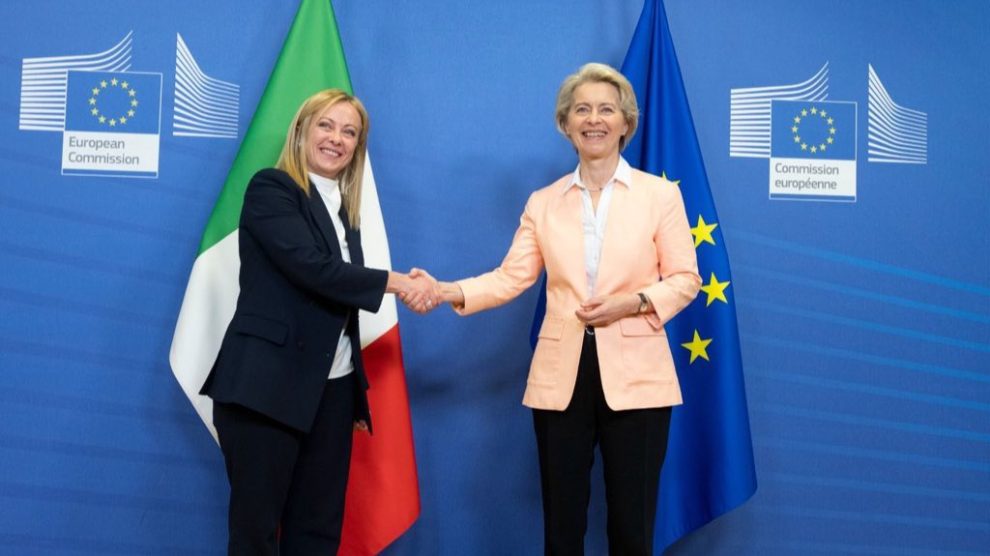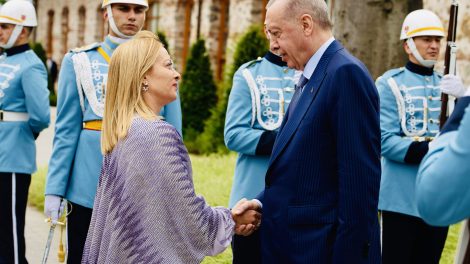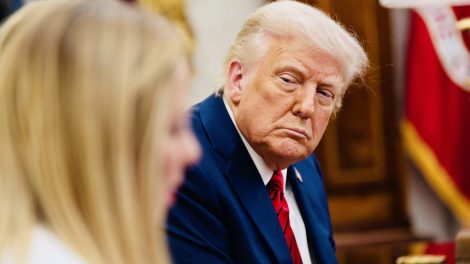EU’re welcome. Giorgia Meloni’s first trip abroad happened on Thursday evening in Brussels, where she got to shake hands with the top European officials. Ms Meloni met with the heads of the European Parliament, Commission and Council – Roberta Metsola, Ursula von der Leyen, and Charles Michel, respectively – and sat down for what she later called “frank” and “constructive” talks.
- Both parts remarked on the importance of the highly symbolic move. The new Italian PM sought to present herself as an assertive-yet-reliable partner and confirm her willingness to cooperate within the bloc.
- In essence, she consolidated her moderate shift, what appears to be a clean break from years of EU-bashing.
- The new Giorgia Meloni paints herself as a credible pragmatist: ready to defend Italy’s interests while acknowledging its place within the EU.
- “I will defend the national interest in a European dimension,” she remarked; “they have understood that we are not Martians, and I have found willing ears.”
Chances and challenges. Ms Meloni and the Euro-leaders touched base on the most pressing issues. Essentially, she intends to start from the blocks laid down by her predecessor but will pursue a few different roads along the way.
- Energy: the top concern on Italy’s mind must be addressed by finalising the bloc’s latest decisions – which include the gas price corridor and reform of the electricity market –, noted the Italian PM. Moving on, she spoke in favour of…
- EU funding for domestic fiscal aid. Member States will most likely redirect uncommitted EU funds to shelter citizens and businesses from the energy crisis. PM Meloni is also eyeing joint debt issuing – the bain of Berlin, but far from rejected elsewhere in the EU.
- Earlier on Thursday, Economy Minister Giancarlo Giorgetti had his first international meeting with his German counterpart Christian Lindner, who’s notoriously frugal on public spending. Reportedly, the Germans reacted with relief – and Mr Lindner only got defensive once in an otherwise constructive meeting.
- Ms Meloni also tested the water vis a vis rewriting Italy’s EU-bankrolled National Recovery Plan, and, reportedly, the European side offered comprehension and hinted at some level of leeway – despite it being a potentially contentious issue.
- On Ukraine and Russia, the Italian PM confirmed Rome’s full alignment with partners in supporting Kyiv and sanctions on Moscow. No surprises there; it will become demonstrably true once the sixth weapons package, which is temporarily frozen, is greenlighted.
- A hint of potential friction emerged on the migration issue, as Italy’s new Ministry of the Interior is currently preventing two migrant-laden NGO ships from entering Italian ports. Just a few hours before Ms Meloni touched down in Brussels, Rome sparred with Berlin, asking it to “quickly” intervene to help the vessel sailing under Germany’s flag. Rome, on its part, is asking member States to commit more seriously to burden-sharing.
The road ahead is rocky with the energy and cost-of-living crises, the Russian war in Ukraine and the broader geopolitical instability. The Italian PM knows it and also knows that Italy’s best course of action is to row together with its Euro-Atlantic partners and ensure proper representation of Rome’s interests within this framework.
- “European integration and leadership in a European context depend very much on the ability to create alliances,” said Mario Mauro, former deputy president of the European Parliament and former Defence Minister, to our sister website. “Therefore, rather than banging our fists on the table, as we have heard so often in the rhetoric of recent years, it would be more useful to be very explicit in asking for and wanting European leadership.” He concluded that that would embody a truly leading country, as former PM Mario Draghi did on the famous train journey to Kyiv.
- Arguably, as Corriere della Sera pointed out, “Brussels knows that it is essential to have a constructive relationship with Italy, especially at this time, when the Franco-German engine seems jammed.”
Image: Giorgia Meloni’s Twitter profile





